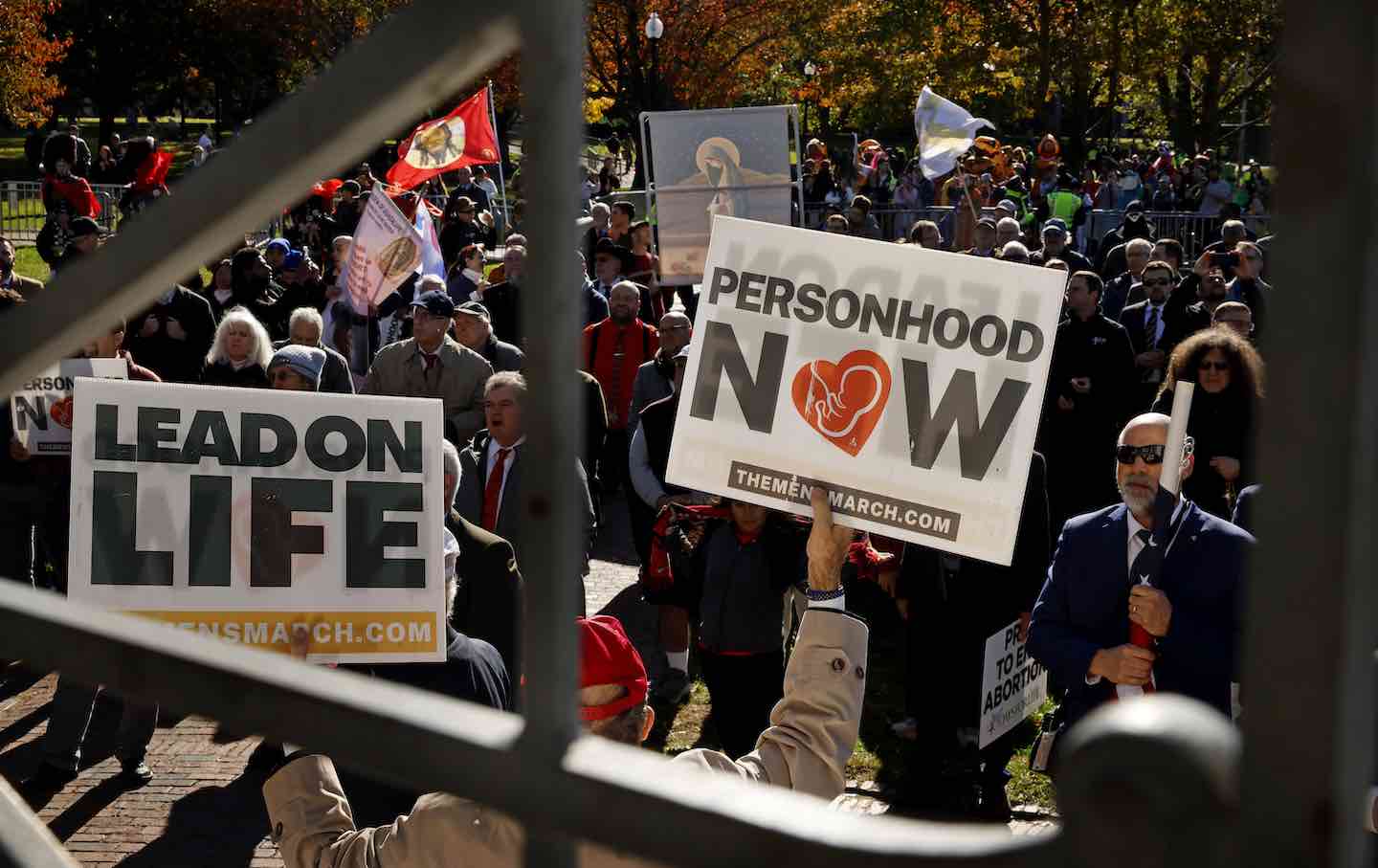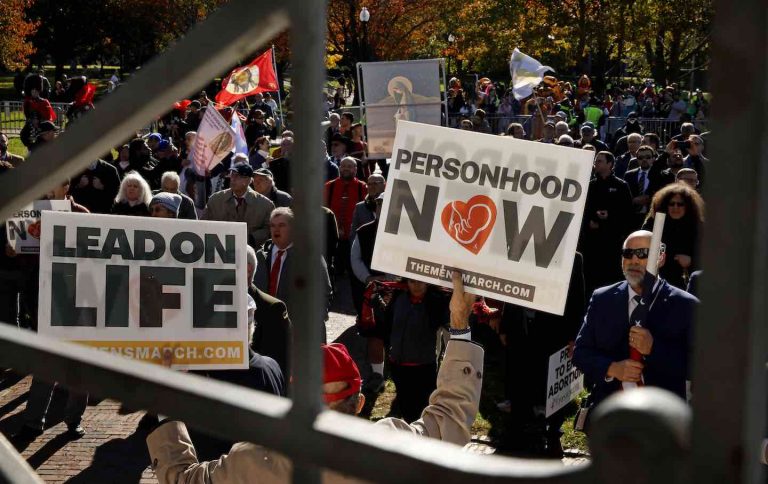People who very much want to become pregnant could soon find their right to procreate restricted by criminal anti-abortion laws protecting embryos.

Demonstrators at the Parkman Bandstand during the National Men’s March to Abolish Abortion and Rally for Personhood on November 1, 2025.
(Craig F. Walker / The Boston Globe via Getty Images)
For over three years, anti-choice state lawmakers have been in a race to the bottom for the worst abortion law in parts of the country where abortion is already severely limited or outright banned. Earlier this year, South Carolina legislators took the lead with their bill that would usher in an era of prosecutions of people who have abortions, not just the people who “aid and abet” abortion seekers. This is all deeply troubling, but what is also clear about the proposed legislation is that it is not just about abortion, despite what its language and supporters might suggest.
Under the bill, an unborn child is “an individual human being from conception [which happens when a sperm fertilizes an ovum] until live birth.” While abortion is the primary target of this proposal, this language has the potential to extend beyond abortion and into assisted reproductive technologies, like in vitro fertilization. And the people who very much want to become pregnant may soon find their right to procreate restricted by criminal laws protecting embryos.
IVF typically involves the creation of embryos that ultimately will not be used to make babies for a host of reasons. Some embryos won’t be used because pre-implantation testing reveals chromosomal abnormalities. Some will be rejected because they are unlikely to successfully implant in a uterus and create a viable pregnancy. And still others won’t be used because they simply are not needed. These unused embryos may be kept in cryogenic storage indefinitely, donated to research (which will end in destruction), destroyed outright, or even “adopted” by would-be parents who do not have embryos of their own.
A vocal segment of the religious right has long argued that the manipulation and destruction of embryos as part of IVF is as bad if not worse than the loss of fetal life caused by abortion, with one source claiming that “the business model…destroys more life than is ever born.” Indeed, the opposition to IVF is so strong within the anti-abortion movement that in October it pressured the president to cave on his campaign promise to make the costly treatments free. In a state like South Carolina that is contemplating a law that makes no distinction between an “unborn child” at 39-weeks gestation and an embryo in a petri dish, it’s easy to imagine substantial barriers to accessing IVF.
In 2024, a different Southern state offered a preview of the ramifications of treating embryos as children. That year, the Alabama Supreme Court declared that frozen embryos were comparable to born children for purposes of a wrongful-death claim against a fertility clinic where the plaintiffs frozen embryos had been accidentally destroyed. In its opinion, that court described the embryos alternatively as “embryonic” and “extrauterine” children being “kept alive” in a “cryogenic nursery.” The bombshell opinion triggered a period of chaos during which clinics canceled planned embryo transfers for IVF patients and stopped providing care for fear of civil and possible criminal sanctions for any action leading to the destruction of an embryo. Only after the passage of a hasty and poorly drafted law purporting to protect clinics from liability were patients able to continue their care in the state.
The South Carolina abortion bill flings open the door for an expansion of wrongful-death actions, as happened in Alabama, on behalf of a woman who has had an abortion (unless she consented), a man who believes he fathered a fetus that was aborted, or the parents of a pregnant minor who has an abortion. Wrongful-death claims are a very old legal tool for people who have lost loved ones because of a third party’s actions to receive monetary damages as compensation for those losses. As the name implies, these claims assume a live person has died. Even where states allow wrongful-death claims for a fetus in utero, they’ve tended to require that the fetus was viable. This is already an expansion of what it means to be a living person, but it was in keeping with the viability line created in Roe v. Wade. Without that line, it is naïve to think that the anti-choice movement won’t continue to expand its reach beyond pregnancy to “unborn children” in “cryogenic nurseries” as the Alabama Supreme Court did.
The American Society for Reproductive Medicine, a leading professional organization for US fertility clinics and providers, describes the South Carolina bill as an “extreme personhood ban,” referencing the personhood movement that undergirds much anti-choice legislation in the United States. Some proponents of extending rights to fetuses demand that all abortions should be illegal and anyone who performs or consents to an abortion subjected to the same penalties as a person who commits murder. In recent testimony before the South Carolina Senate Medical Affairs Committee, Mark Corral, leader of the anti-choice group Equal Protection South Carolina, told committee members: “Failing to treat the murder of preborn children as homicide in the same way that we treat homicide of born persons violates God’s law, the U.S. and state constitutions.”
State legislatures are not the best places to make medical decisions or set standards of care for medical practice. Legislative interference in medicine leads to bad outcomes, especially when the state seeks to redefine terms that have specific meanings, like conception, abortion, and contraception—all of which this bill does. Once a state like South Carolina successfully enshrines an expansive definition of unborn children into law, it makes it easier to go further. Going further can mean lawmakers directly attacking IVF by criminalizing providers who routinely engage in embryo destruction as part of their work. It could also mean police and prosecutors pursuing criminal charges against pregnant women who experience miscarriages or stillbirths that they deem suspicious. And in fact, South Carolina already has the dubious distinction of being “an originator of the hospital-to-criminal investigation pipeline that underpins modern pregnancy criminalization,” according to Pregnancy Justice, an advocacy group fighting the criminalization of pregnant people.
The successful campaign to overturn Roe v. Wade did not just impact abortion care—it moved us ever closer to a world in which pregnancies belong to the state and not to the women and others with capacity for pregnancy who carry them. Those of us fighting for reproductive justice in the United States must continue to speak about these connections and the fact that abortion law can and will be wielded as a weapon against anyone with capacity for pregnancy whether they are already pregnant, seeking pregnancy, carrying a doomed pregnancy, or even dying from a pregnancy. We already see this in the dozens of states that disregard the wishes of pregnant people by carving them out of living will statutes or courts that force obstetric interventions like C-sections on non-consenting patients, and as described here, the slow slide toward legal protection for embryos.
It’s irresolvable to give an embryo or fetus rights without diminishing the rights of pregnant people. By contrast, it is absolutely possible to show respect for embryos and fetuses without denigrating the decision-making capacities of people who happen to be pregnant. Now, not 50 years from now, is the time to decisively and defiantly stand up for pregnant people and people seeking pregnancy before their status as second-class citizens becomes so deeply entrenched in the law that it is almost impossible to detach.

